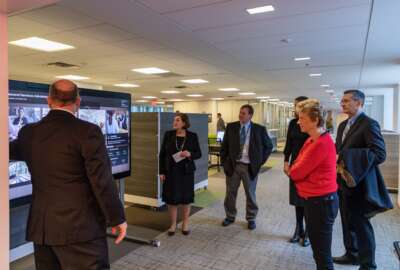
GSA targets underutilized property as feds telework, but agencies not giving up office space
The Biden administration sees a major opportunity to sell office space the federal government no longer needs, now that much of the federal workforce has adapte...
The Biden administration sees a major opportunity to sell office space the federal government no longer needs, now that much of the federal workforce has adapted to working from home.
Many federal employees prefer teleworking from home, and many agencies have adopted a “hybrid” schedule of bringing employees back to the office for a few days every pay period.
But agencies, unsure of their long-term office space needs, have been reluctant to give up the space they already occupy.
While Republican lawmakers have called for federal employees to return to the office full-time, GOP members of the House Transportation and Infrastructure Committee said agencies are in a unique position to sell underutilized, but high-value real estate in the D.C. metro area and beyond.
Economic Development, Public Buildings and Emergency Management Subcommittee Chairman Scott Perry (R-Pa.) said federal occupancy rates in the D.C. metro area remain half of what they were before the COVID-19 pandemic, and that “ongoing telework policies have only made this problem worse.”
“All of these circumstances set the stage for an opportunity to right-size federal space and shed unneeded real estate. If the agencies aren’t using it, quite frankly, they should lose it,” Perry said during a subcommittee hearing on Wednesday.
For decades, several administrations have sought to freeze and reduce the amount of federal real estate. The Government Accountability Office has also put federal property management on its list of high-risk government programs.
The Biden administration, in its fiscal 2024 budget request, also directs agencies to prepare for “evolving work environments, where teams are likely to be more distributed on a continual basis than in the past.”
Nina Albert, the commissioner of the General Services Administration’s Public Buildings Service, told the subcommittee that some agencies are leading office space consolidation efforts, “because they are more confident in what their plans are.”
More broadly, however, Albert told lawmakers that much of the federal government is still uncertain about how much office space the federal workforce will need in the long term.
“Where the pendulum’s swinging, it has not set,” Albert said, adding that GSA is working with each agency on its office space plans.
Kay Sargent, the director of workplace at the architecture and design firm HOK, said each agency’s office needs will vary.
“What’s right for the FBI may not necessarily be right for the IRS. Whether you work remotely or not has nothing to do with whether you want to. It has to do with your job — what is needed of you, and what is required and some people can do that amazingly well, and other people can’t,” Sargent said.
Agencies are hesitant to predict what the future of the federal workplace will look like, but Sargent told lawmakers that agencies are unlikely to bring a critical mass of the federal workplace back to a pre-COVID routine of coming into the office five days a week.
Sargent said the federal workforce, especially younger generations, expect additional workplace flexibility, especially as more supervisors in and out of the government expect employees to be “available 24/7” to respond to work-related messages.
“Our way of working has changed significantly in the last 30 or 40 years and the pushback that we’re getting from the workforce right now is basically, ‘We can’t sustain at this level, and go in every single day and give up everything,’” Sargent said. “We need to get people into the office more than they’re there now, but we also need to find some way to have some balance.”
‘No one knows’ future workspace needs
Rep. Chuck Edwards (R-N.C.) urged agencies to consolidate office space, but said they should also bring federal employees back to the office full-time.
“I’m certainly in favor of consolidation. I believe that there has to be a way we can reduce the unused floor space that I’ve seen here, but I think that we need to do it in a way that would insist that people be at work. We don’t need a hybrid model in the federal government. We need people at work,” he said.
Edwards said his office hears from constituents every day that are unable to get through to the IRS, the Social Security Administration and the Department of Veterans Affairs.
“Many times, I believe, it’s because the people that work in those agencies are on their sofa, doing their laundry while they’re doing Zooms, and walking their dogs, and watching Oprah and all that sort of thing,” Edwards said.
Congress in December 2016 created the Public Buildings Reform Board, under the Federal Assets Sale Transfer Act (FASTA). The board recommends high-value, but underutilized federal properties that GSA could put for a fast-track sale and disposal process.
But former Rep. Michael Capuano (D-Mass.), a member of the PBRB, said federal employees are likely to leave their agency — or federal service altogether — if they’re expected to work in the office every day.
“You make somebody come back five days a week that doesn’t want to — in today’s world, they can easily find another job, and they will,” Capuano said.
Members of the House Oversight and Accountability Committee recently scrutinized the Office of Personnel Management for encouraging workplace flexibilities for federal employees, and not bringing the federal workplace back into the office full-time.
Capuano, however, said it’s impossible for OPM to pinpoint just how many federal employees are working from home on any given day — and that such a metric is a moving target.
“Even if they could answer it for today, they won’t be able to answer it for tomorrow or six months from now, because just no one knows. And I don’t think it’s much different in the private [sector] world either,” Capuano said.
Tim Horne, a former GSA executive, now the executive vice president of portfolio management at Boyd Watterson Asset Management, said agencies face the same challenge as the private sector in getting employees to return to the office.
“If you’re the manager of a Social Security Administration call center somewhere in the United States, you’re really struggling to train new employees. You’re struggling to implement a culture and to bring new people in, and to keep people engaged — and frankly, to hold those that aren’t performing accountable,” Horne said.
‘We have a lot of underutilized space and we need to do better’
Albert said GSA is looking at its current real-estate portfolio as three separate buckets.
The first bucket Albert said, is made up of federal buildings that hold long-term strategic value for the federal government.
“It does not matter what the exact occupancy is. What matters is that that facility serves a long-term purpose for the federal government and we can backfill and manage occupancy over time,” Albert said. “We have to modernize those assets and continue to maintain them.”
GSA is also focused on a second bucket of underutilized real estate, which is becoming increasingly more costly to maintain.
“Those assets are the ones that we will put in our disposal pipeline. We’ve had a long disposal pipeline for some time, and we’ll continue to feed that disposal pipeline,” Albert said.
Those are the types of properties PBRB is looking at helping the federal government sell. But Capuano said it takes agencies time and money to relocate their employees to a new, consolidated location when moving out of a property.
“It does take time to actually physically move any agency from point A to point B, it just takes time and coordination … nobody [just] snaps their fingers,” he said.
The third budget includes many GSA properties that fall in the middle of the other two categories.
“We’re trying to understand how the pendulum will swing and what ultimate utilization is for the next decade,” Albert said. “Utilization shifts over time, as workforce and workplace trends shift over time. So there’s no magic number, but we’re managing that middle, as we understand how the pendulum will swing.”
To reinvest and modernize federal buildings, GSA is asking Congress in its 2024 budget request to have full access to the Federal Building Fund, which contains the rent payments the agency collects from its federal tenants.
Albert said access to these funds would help GSA consolidate, but improve, office space for their office space.
Sargent said agencies can make better use of the office space they already have.
“Quite frankly, we have a lot of underutilized space and we need to do better. But we also need to stop rewarding people with space. Not everybody needs a dedicated huge office or a dedicated individual space, especially if you’re not going to be there every single day. We need to learn to share, and not every single agency needs a tricked-out gym and a tricked-out conference room, when they’re right across the street from each other,” Sargent said.
The 2023 omnibus spending deal reached by Congress also directs GSA to provide regular briefings to the House and Senate appropriations committees on how agencies can reduce their office space requirements “based on the lessons learned from the use of telework during the pandemic.”
Meanwhile, the Office of Management and Budget, in a memo in July 2022, directed agencies to rethink their office space needs for the future of work in the federal sector. OMB gave agencies until December 2022 to submit their capital plans, which will outline workspace needs through 2028. OMB, however, has not publicly released those agency plans.
Consolidation for DHS, FBI headquarters
Some of GSA’s biggest federal consolidation efforts underway predate the pandemic.
The Department of Homeland Security, for example, is looking to reduce its reliance on leased office space by bringing most of its components to its St. Elizabeths campus in Southeast D.C.
The St. Elizabeths campus project has been in the works for more than a decade. It’s expected to help DHS consolidate from more than 50 locations across the D.C. area.
“The ongoing work at St. Elizabeths is of great importance to the federal government and will result in significant savings for taxpayers,” Del. Eleanor Holmes Norton (D-D.C.) said.
The project, however, has experienced funding shortfalls and construction delays. Norton said some DHS components anticipating the move to St. Elizabeths have made short-term extensions of their leased office space.
“If these leases must be extended, or if these term extensions reach holdover status, the already high cost of the leases will increase,” Norton said.
Albert said the fiscal 2023 omnibus spending plan allowed GSA and DHS to move ahead with headquarters for the Cybersecurity and Infrastructure Security Agency, as well as the DHS Office of Intelligence & Analysis.
“Last year was an incredibly important funding year in order to be able to see through that consolidation effort this year,” Albert said.
Albert said GSA, in its fiscal 2024 budget request, is asking for the “last phase” of building out the DHS campus. Albert said GSA doesn’t have plans yet for the old DHS headquarters will be vacating on Nebraska Avenue.
Albert said the GSA also doesn’t have plans for what it’ll do with the J. Edgar Hoover Building, once the agency decides on the site of a new suburban headquarters for the FBI. The agency is close to a final decision, after hearing a final pitch from both Virginia and Maryland lawmakers.
“We know that that’s going to need to be occupied until a new headquarters and campus are delivered,” Albert said. “We don’t have immediate plans that we can share, because we don’t know what they are until we have the funding necessary to execute on the FBI headquarters.”
Among those decisions, Albert said GSA will have to decide if the federal government has a long-term need for the J. Edgar Hoover Building, “or whether it makes more sense to dispose of that property and put it back into private circulation.”
Correction: An earlier version of this story incorrectly attributed quotes to Nina Albert, the commissioner of the General Services Administration’s Public Buildings Service. Those attribution has since been updated to reflect quotes made by Kay Sargent, the director of workplace at the architecture and design firm HOK.
Copyright © 2024 Federal News Network. All rights reserved. This website is not intended for users located within the European Economic Area.
Jory Heckman is a reporter at Federal News Network covering U.S. Postal Service, IRS, big data and technology issues.
Follow @jheckmanWFED
Related Stories

Test out what your office space of the future could look like at GSA’s new innovation lab




